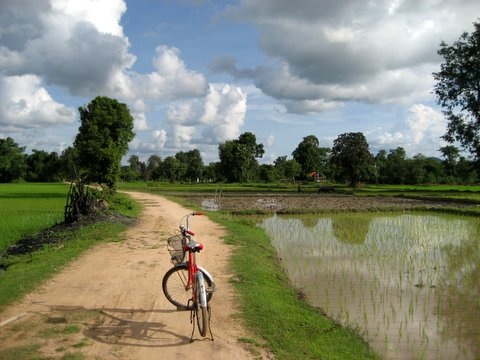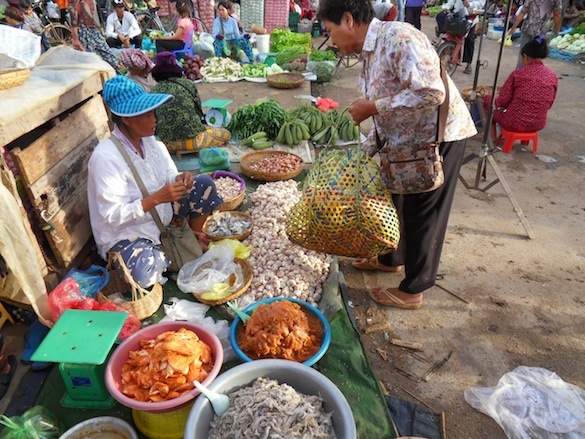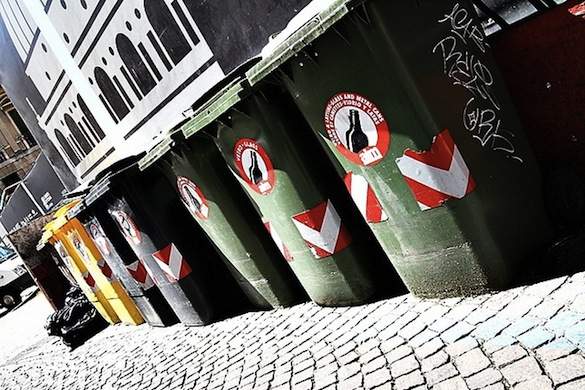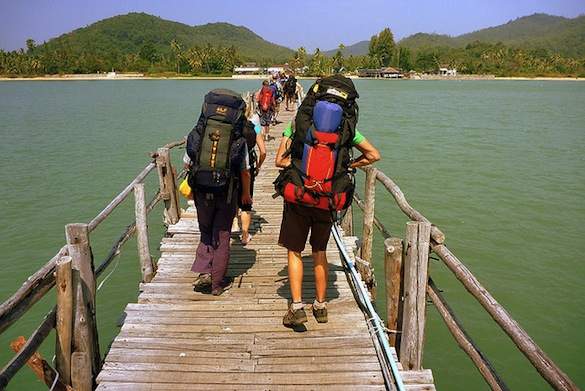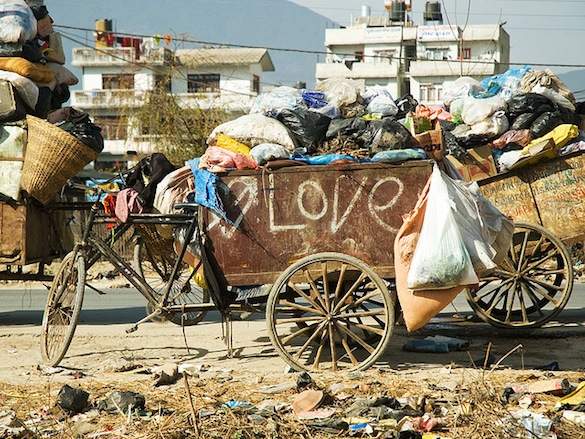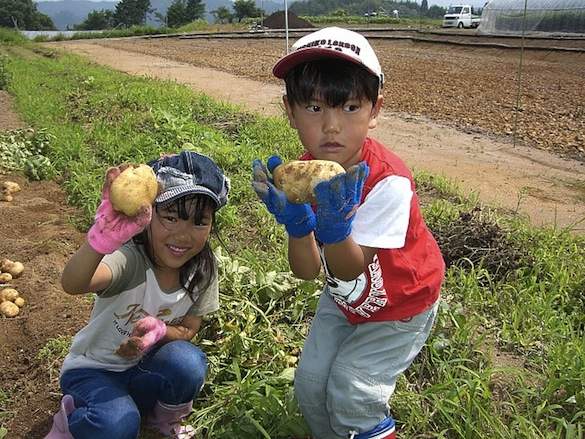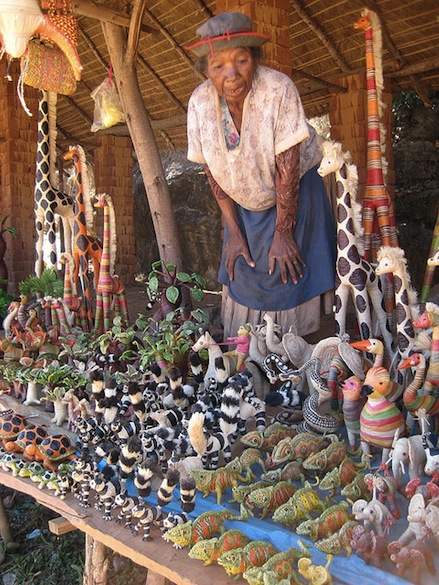Our “Sustainable Travel” series is sponsored by Global Basecamps. Global Basecamps is specialty travel company that helps independent travelers research and book locally owned boutique hotels, off-the-beaten path lodges and multi-day excursions all over the world. Whether hiking the Inca Trail, experiencing a traditional Japanese Ryokan, or relaxing on the beaches of Thailand, Global Basecamps specializes in designing completely customized itineraries to meet each travelers specific priorities and match their travel style.
Eco-travel has become one of those catch-all phrases that appear ever enticing to the conscientious traveler, but does signing up for that ‘eco-friendly’ package tour really make a difference? ‘Green’ travel shouldn’t have to come complete with a hefty four-figure price tag and the truth is that environmentally friendly travel is best done on a budget. In fact, much to the glee of budget-savvy backpackers like myself, saving money and saving the environment are two things that go hand-in-hand. For those travelers that are feeling the burden of their carbon footprint, here are some easy-to-follow tips to not only minimize the damage to the environment but limit the impact to your wallet too. So really, there’s no excuse!
Take your time
Slower travel is not only a good way to stretch out your bank balance, but beneficial for the environment too. Traveling for longer, following a more frugal lifestyle and enjoying the benefits of local transport certainly minimizes some of the biggest culprits of global warming – mass-consumption, waste and carbon emissions.
Not only that, but traveling slowly can be a great excuse to check out different transport options – ditch the internal flights and opt for a slow boat down the river, a cross-country train or a cargo ship across the Atlantic. Try wherever possible to limit flights to a direct flight to and from your destination and once you reach your destination, undertake a walking or cycling tour of the area or make use of public buses to get you from A to B. The idea is to minimize your impact on tourist areas, live and travel as the locals do and connect with the local community as much as possible.
>> Find the skills you need for traveling in developing countries
How, not how much
Assess how you spend your money and where or to whom your money is going to. Are you supporting local businesses and tradesmen or pumping your money into multinational companies and foreign chain stores? Are you encouraging sustainable tourism or indulging in thoughtless souvenir shopping sprees? Think carefully about the services you pay for and the resources used to provide them.
Buying local is one of the key principles of eco-friendly living and never is this more applicable than on your travels. Can you stay at a small, family-run guesthouse, buy your dinner from street vendors and purchase toiletries from the local corner store? Why not go to a local pub over a tourist bar or ask around for a local masseuse instead of frequenting the hotel spa? Remember that a few dollars in the right hands is worth much more than an expensive tour ticket and will undoubtedly be a whole lot cheaper too. Plus, if you spend the time searching for local alternatives you’re likely to get a much better grasp of the local customs and culture.
Go back to basics
Traveling, particularly budget travel, shouldn’t be about luxury and home comforts, and many a road-weary traveler will rave about how much freer they felt after cutting down on their belongings. Master the art of carrying and using only what you need – cut back on appliances like hairdryers, straighteners or electric razors and go back to basics – you’ll soon find you don’t miss them and the few kilos lost from the weight of your backpack will be an extra bonus.
Think about your power usage when checking into hostels too – can you get by without air conditioning, fresh daily towels, hot water or 24-hour electricity and clip a few dollars off the room price? It’s not about depriving yourself but about using luxuries only when you really need them and learning to live without the non-necessities – you’ll probably find yourself adopting many of your good habits into your everyday life once you get back home.
>> Learn how to travel very lightly
Support sustainable travel
‘Green’, ‘Organic’ and ‘Eco-friendly’ may be terms thrown around lightly in the tourism sector, but if you do your research you should be able to find plenty of tour companies and guesthouses that are really making an effort to do things differently. Book tours with sustainable and social/environmentally responsible companies, and look for eco-friendly hostels or aim to use smaller, local guesthouses.
Make a point of supporting sustainable tourist initiatives such as tour companies that employ locals and give back to local communities. Before you check-in or book with a company, ask about environmental and recycling policies and make it known to those in the tourist trade that Westerners really do care about these practices. Make use of recycling facilities and dispose of trash responsibly, even if locals do differently – there’s no reason why you shouldn’t set a good example.
>> Read about unique ways to experience sustainable travel
Share resources
Solo travelers can be one of the biggest drains on environmental resources so consider traveling in a group or joining up with other solo travelers on the road. Not only can you split the cost of accommodation, transport and necessities but you’ll use fewer resources and create much less waste than you would on your own. Consider pooling your money together with other travelers and cooking together, organizing day-trips where you can share a taxi or minibus and leaving behind resources like books, leftover food or clothing for others when you leave.
Check out car-sharing resources like Share Your Ride or Catch a Lift to locate fellow backpackers and share transport and if you have your own transport consider putting up a notice in your guesthouse or local traveler haunts for others to join you. You’ll split fuel costs, save on emissions and get a free travel companion! If you prefer to travel alone, why not connect with locals rather than other travelers and utilize organizations like Couchsurfing or Hospitality Club. You’ll save dollars on accommodation, make new local connections and surely amass some unique travel tales along the way.
>> Learn about how to make friends on the road
Minimize your trash
Any traveler who’s returned home with a backpack full of used bus tickets, information booklets and mystery-location maps will testify to the growing pile of rubbish that long-term travelers seem to accumulate. Cut down on the waste by carrying a notebook to jot down information instead of picking up leaflets or tour brochures and investing in a refillable collapsible water bottle instead of buying plastic bottles daily. A good filter system or purification tablets not only reduces the amount of plastic waste but will save on the cost of expensive mineral water too – a worthwhile investment for long-term travelers.
Reuse bags, toiletry bottles and eating utensils wherever possible and recycle your own cast-offs by donating old clothing, sleeping bag or shoes to your guesthouse or a local shelter. If you have good quality, but damaged items that you don’t need anymore considering donating them to local traders – a tailor, for example, could fix up broken shoes or clothing and sell them on. Just be careful to assure them that they’re doing you a favor by taking them off your hands!
>> Discover more ways to minimize your impact in developing nations
Don’t forget what you’ve left behind
Prepare for your trip by making sure everything is in order at home before you go. Sure, you’ve probably remembered to turn off the lights and heating, but what about canceling your newspaper delivery or asking your cell phone or internet companies if they can suspend your service whilst you’re away (not very practical for a short trip, but if you’re planning several months or more of traveling, many companies will agree to suspension or a bonus travel package). Unplugging the TV and other appliances and turning off the water mains will eliminate any extra power wastage, as well as being a useful security precaution.
If you’re going away for more than a few weeks consider emptying out the fridge and turning it off while you’re away. To make things easier for you while you’re traveling, change your bank accounts to deliver online instead of paper statements and save any important documents you’ll need to an online email account or portable USB stick – this will save on paper as well as providing a useful backup solution in case you lose your hard copies.
Get involved
Practice what you preach by making use of voluntary organizations like WWOOF or Help Xchange, where you can not only contribute to and learn about sustainable, organic farming practices but you can also earn your keep and save cash on accommodation and food. For something a bit different, why not try a stay in an eco-village, a sure-fire way to boost your eco-credentials and connect with a network of like-minded thinkers.
>> Learn more about WOOFing or volunteering while you travel
Become an animal lover
Responsible travel is not just about cutting down on waste and treading lightly – spare a thought for the world’s wildlife too. Animal cruelty and exploitation, destruction of wildlife, as well as illegal poaching and killing of endangered animals, are sadly all very real issues happening in tourism hotspots all over the world.
If you are planning to visit local animal sanctuaries, zoos or partake in animal riding (elephant or camel trekking, for example), do your research and don’t believe everything you are told – sometimes even the organizations that appear to treat their animals humanely, act very differently behind closed doors. If in doubt, avoid any activity that is unnatural for the animal and choose instead to support tours that visit animals undisturbed in their natural habitats – whale or dolphin watching or non-intrusive walking safaris for example.
Be wary of purchasing illegal souvenirs that contain endangered animal or plant products – often these elements are used in handcrafted souvenirs without the buyer’s knowledge. The World Wildlife Fund’s (WWF) Buyer Beware guide offers some excellent advice on avoiding souvenirs that are illegal or damaging to conservation efforts.
>> Learn about volunteering at an animal shelter
Sustainable travel not only focuses on minimizing the negative environmental impact of travel but also on how travelers interact with the physical and cultural environment while at their destination. All of Global Basecamps’ custom tours have a unique cultural aspect, allowing travelers to gain a deeper understanding of the lifestyle of the local people while contributing to the local economy. For example, travelers will explore local villages on Global Basecamps’ Tanzania safaris and discover farming and irrigation techniques, visit houses, and sample the local tribe’s cuisine. Additionally, going on a safari in Tanzania doesn’t mean there has to big a hefty price tag, Global Basecamps offers options like camping safaris, which enable travelers to spend their nights in a canvas tents close to the wildlife and under the beautiful Serengeti night sky. Another great example of slow lower impact travel is hiking the Inca Trail to reach Machu Picchu instead of using other forms of transportation. Global Basecamps’ Inca Trail treks also help directly fund conservation of the trail itself, as well as supporting habitat conservation and wildlife monitoring projects.
Contact Global Basecamps to enquire about this or other trips.
Photos by: A_of_doom, Triskay86, click2enlarge, Siim Teller, ktm.hoke, Reuben Whitehouse, strikeael, gripso_banana_prune

